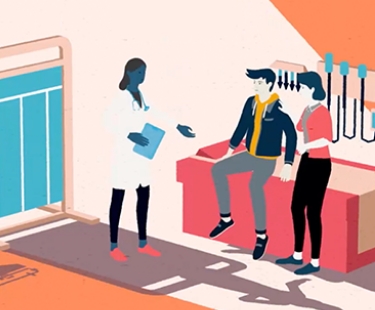COMMON QUESTIONS ABOUT MENINGITIS B
IS MENINGITIS B LIFE-THREATENING?
It can be. Meningitis B is an uncommon but serious disease that is caused by the bacterium Neisseria meningitidis. It can lead to an infection of the lining of the brain and spinal cord or an infection of the blood (known as septicemia). Meningitis B can strike without warning and progress quickly.
IS IT TRUE THAT MENINGITIS B CAN BE FATAL WITHIN 24 HOURS?
Potentially. Symptoms such as sudden fever, severe headache, and neck stiffness can progress rapidly and can become serious and possibly fatal. While most people recover from meningitis B, some may end up permanently disabled and suffer from disabilities including hearing loss, brain damage and nervous system problems, kidney damage, loss of limbs, and skin scarring. Although meningococcal disease is uncommon, about 1 in 10 people infected with the disease will die, sometimes within 24 hours.
HAVE THERE BEEN OUTBREAKS OF MENINGITIS B?
From 2011 through March 2019, colleges and universities reported meningitis B outbreaks on 13 college campuses; during this time there were 50 meningitis B cases, including 2 deaths among an at-risk population of approximately 253,000 students.*
*An outbreak is defined as 2–3 outbreak-associated cases within a 3-month time period.
WHY DO TEENAGERS AND YOUNG ADULTS HAVE HIGHER RATES OF MENINGITIS B?
The bacteria that cause meningitis B live in the nose and throat and are spread from one person to another by close contact. They can be spread through certain everyday behaviors common among teenagers and young adults, including coughing & sneezing, sharing drinks & eating utensils, kissing, and living in close quarters.
HOW DOES MENINGITIS B SPREAD?
The bacteria that causes the disease can spread when a carrier or infected person comes in close contact with another person (for example: by coughing or sneezing, kissing, or sharing eating utensils).
HOW CAN I FIND OUT IF MY CHILD ALREADY RECEIVED MENINGITIS B VACCINE?
If you aren’t sure whether your teen or young adult has received meningitis B vaccination, contact their healthcare provider’s office and ask for your child’s vaccination records. If records confirm they haven’t received meningitis B vaccination yet, bring it up at the next doctor visit.
HOW DO I BRING UP MENINGITIS B WITH MY CHILD’S DOCTOR?
If your child hasn’t had meningitis B vaccination yet, plan to ask about it at their next appointment. If they don’t have an upcoming appointment, don’t be afraid to make one!
DO I NEED TO GET VACCINATED IF I ALREADY RECEIVED A MENINGITIS VACCINE WHEN I WAS YOUNGER?
The meningitis vaccine most people have received covers meningitis groups ACWY, not meningitis B. Since a meningitis B vaccine was not available until 2014, most teenagers have not yet received the vaccine suggested for 16- to 23-year-olds.
Millions of teens aren’t vaccinated against meningitis B.
Vaccination may not protect all recipients.
KNOW THE FACTS, BE PREPARED
Although vaccination may not protect all individuals, vaccination against meningitis is your best defense against the disease, according to the CDC.
It’s important to talk to your doctor or pharmacist about whether meningitis B vaccination is right for you. Download this fact sheet to better discuss meningitis B with your healthcare provider:
HELP PROTECT YOUR LOVED ONES
Talk to your healthcare provider about a meningitis B vaccine.

